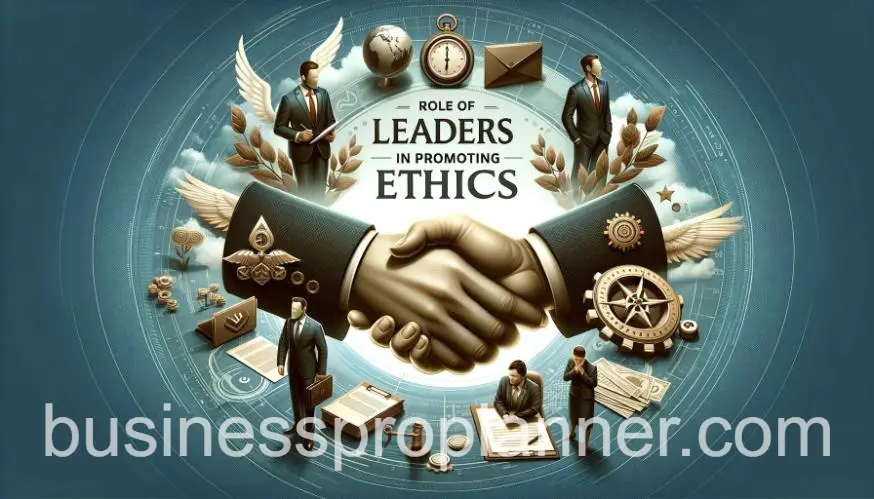Ethical leadership and business ethics are critical topics in today’s corporate world. High-profile scandals at companies like Enron and WorldCom have highlighted the destructive effects of unethical behavior. Unethical practices like fraud, discrimination, and deceptive advertising can badly damage a company’s reputation and ultimately its bottom line.
In this environment, there is a strong need for ethical leaders who make principled decisions and foster ethical conduct throughout their organizations. Business ethics goes beyond legal compliance and involves implementing ethical values like honesty, fairness, and integrity in business activities. Ethical leaders shape workplace culture by serving as ethical role models and encouraging ethical behavior among employees.
This article examines the traits and responsibilities of ethical leaders, the importance of business ethics, and how leaders can promote ethical values in their companies.
Key Takeaways
- Ethical leadership is important for building trust and credibility within an organization
- Leaders need to demonstrate strong ethical values and make decisions that consider all stakeholders
- Developing a positive workplace culture with ethical values at its core helps attract and retain top talent
- Businesses need to operate ethically and consider their social responsibility to have a positive impact
What is Ethical Leadership?
Ethical leadership refers to leading in a manner that respects ethical beliefs and values and exhibiting integrity and trustworthiness. Ethical leaders make principled choices, even if they result in diminished short-term earnings or unpopularity.

Key traits and characteristics of ethical leaders include:
- Integrity and Trustworthiness: They build trust by keeping promises and displaying honesty and principled behavior. Their actions are consistent with their stated values.
- Concern for People: Ethical leaders treat people, whether employees, customers, or other stakeholders, with dignity and respect. They consider how their decisions will affect people.
- Ethical Awareness: They have strong capacities for ethical reasoning and moral judgment. They can identify ethical issues and dilemmas.
- Fairness and Objectivity: They make balanced decisions based on facts, not personal biases. Resources and rewards are distributed fairly based on contributions.
- Role Modeling: They serve as role models by visibly demonstrating ethical behavior. Their conduct sets the tone for the entire organization.
- Accountability and Transparency: They hold themselves accountable for ethical conduct and results. They communicate openly about ethical issues affecting the company.
Why are Business Ethics Important?
Business ethics refers to implementing ethical values like trust, honesty, fairness, and integrity in business activities. It goes beyond mere legal compliance with laws and regulations.
Adhering to ethical standards provides many benefits:
- Enhances reputation – Companies with a strong ethical identity are favorably viewed by customers and the public.
- Attracts talent – Workers increasingly seek employers with ethical practices and social responsibility.
- Improves decisions – Ethical awareness leads to balanced, principled decision-making.
- Boosts morale – Ethical conduct improves employee motivation, retention, and satisfaction.
- Avoids litigation – Many legal problems result from unethical behavior like harassment and discrimination.
Unethical conduct can greatly harm organizations. For example, environmental pollution, bribery, and deceptive advertising can ruin a company’s image and relationships with key stakeholders. Major scandals can be costly and difficult to recover from.
Role of Leaders in Promoting Ethics
Business leaders play a pivotal role in promoting ethical conduct in their organizations. Their leadership style and actions signal acceptable behavior to employees. Leaders can foster ethics through:

- Values-Based Leadership: Articulate key ethical values like trust, accountability, and integrity. Make decisions consistent with those values.
- Role Modeling: Set a personal example of ethical behavior. Show that you will not compromise ethical standards.
- Standards and Policies: Institute formal ethics standards like codes of conduct. Establish policies on issues like harassment and whistleblowing.
- Training and Communication: Provide regular ethics training. Continuously communicate about the importance of ethics.
- Rewards and Discipline: Link rewards like compensation and promotion to ethical behavior. Consistently discipline misconduct.
- Culture of Voice: Encourage employees to freely voice ethical concerns. Create anonymous reporting channels if needed.
- Stakeholder Orientation: Consider how policies affect the interests of customers, employees, the environment, and society.
- Ethical Leadership Styles and Behaviors: Certain leadership styles and behaviors are particularly effective at promoting ethical conduct:
- Empowering Leadership: Empowering leaders gives employees autonomy and resources to exercise ethical judgment. This results in more principled behavior than micromanaging.
- Humility: Humble leaders admit mistakes, limitations, and vulnerabilities. This promotes ethical behavior by making it acceptable to acknowledge errors.
- Moral Reasoning: Discussing ethical dilemmas and tradeoffs out loud helps leaders improve moral judgment and make balanced choices.
- Ethical Role Models: Highlight employees and leaders who embody ethical conduct. Praise principled behaviors like reporting misconduct.
- Self-Reflection: Self-reflection helps leaders deepen moral awareness. Regularly review your decisions from an ethical perspective.
- Stakeholder Consideration: Consult with employees, customers, and community members affected by policies. This results in more ethical decisions.
Corporate Social Responsibility
A strong ethical culture also encompasses corporate social responsibility (CSR) initiatives. CSR refers to company activities that benefit society, like:
- Environmental Stewardship – Reducing waste, emissions, and resource use through sustainability programs.
- Community Service – Donating employee time and funds to charities and local community organizations.
- Ethical Labor Practices – Ensuring safe working conditions, fair compensation, and no discrimination or harassment.
- Human Rights Protection – Avoiding complicity in human rights abuses anywhere along the supply chain.
- Ethical Marketing – Honestly representing products without deception. Protecting customer data privacy.
Socially responsible companies aim to create value for society, not just profits. CSR improves community relations, employee morale, and brand reputation.
Teaching Ethics in Business Schools
Given the vital importance of ethics in modern business, business schools have expanded ethics training in their curriculums, through courses like:
- Ethical Leadership – Models and skills for values-driven leadership.
- Corporate Social Responsibility – Strategies for meeting societal responsibilities.
- Stakeholder Management – Balancing diverse stakeholder needs when making decisions.
- Ethical Decision-Making – Recognizing and resolving ethical dilemmas.
- Professional Ethics – Ethical issues common in certain careers like accounting and finance.
- Business Law and Ethics – Laws regulating issues like employment, environmental protection, and contracts.
The goal is for students to internalize ethical reasoning skills to call upon throughout their careers when facing complex decisions.

Conclusion
In today’s global economy, strong ethical standards are crucial for competitive business leadership. Ethical leaders, adept in leadership skills, guide their teams toward principled rather than convenient choices. This approach, grounded in ethical business practices, is reinforced through a firm ethics policy and training.
Organizations thus become trusted entities, positively impacting society. Such dedication fosters sustained success, building on strong organizational relationships. Ultimately, it advances the pursuit of ethical excellence in standards and leadership in business.
